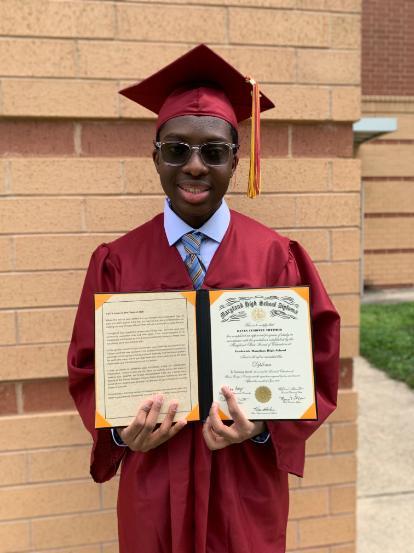Select a name from the list below to revisit past interviews with students, alumni, faculty, and staff.
Dr. Antoine Deas (staff, Academic and Transfer Advisor)
Tyree Brown (student, media production)
Michele Richardson (program director, Wellness Center)
Jonn Mack (assistant professor and program coordinator, Paramedic Program)
Kevin Totimeh (student, chemistry)
Chaw Kalayar (program coordinator, English for Refugees and Asylees)
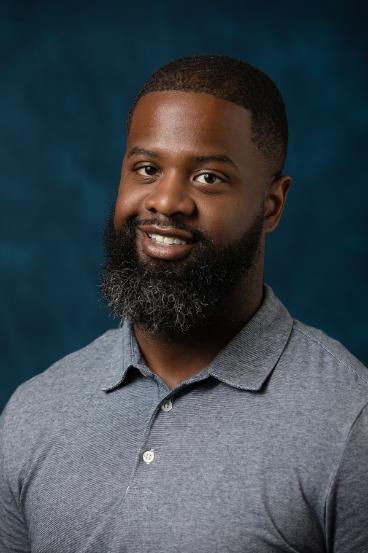
Dr. Antoine Deas
Academic advisors help create initial memories for new students at Prince George's Community College (PGCC) by supporting students from the beginning of their journey through degree or credential completion. Dr. Antoine Deas has been an academic and transfer advisor at the College since 2019. Dr. Deas, originally from Sumter, South Carolina, came to PGCC because of his drive to work at the community college level. “Community colleges serve the community, and I think that PGCC does a great job providing a variety of services and resources to the community,” he notes.
While Dr. Deas’ role requires him to advise students about their goals at the College, he also provides guidance to students who are interested in continuing their education at a four-year institution. This requires him to have a deep understanding of the transfer process and connections with many local four-year institutions to which PGCC students transfer. This unique advising experience is crucial for the overall success of students. “The most rewarding part of my job is being able to help students realize their potential and academic goals, as well as plan their academic journey from enrollment to graduation or transfer,” he shares.
The College’s transfer services area provides a number of additional resources to students who are interested in transferring to a four-year institution. Among programs and services offered to students each semester, they host Pre-Transfer Week. This series allows students to get acclimated to the transfer process. Previous events during Pre-Transfer Week include: alumni panels, virtual and in-person college tours, collaboration with PGCC's 15 partner community colleges to host Maryland statewide transfer fairs, and the HBCU Experience & Meet the Greeks in partnership with Bowie State University.
Through his work, Dr. Deas seeks to implement the motto of “serving one student at a time.” “There is no one-size-fits-all model because advising is more than classes,” he explains. Each day, Dr. Deas is motivated to come to work because there is a student who is depending on him.
Dr. Deas is a graduate of Benedict College, with a Bachelor of Arts in Psychology. He received a Master of Education in Community Mental Health Counseling from Winthrop University, and a Doctor of Education in Executive Community College Leadership from Wingate University.
Learn more about the Office of Student Academic Planning and Career Readiness.
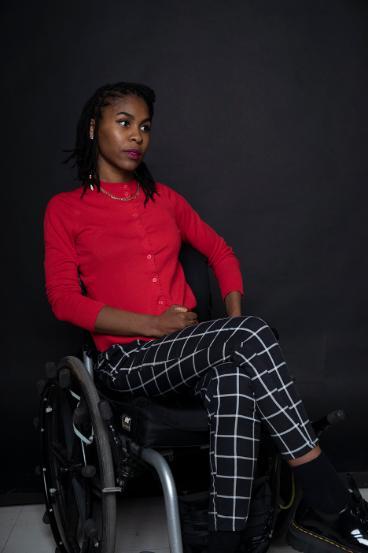
Tyree Brown
Prince George’s Community College student and rising talent Tyree Brown’s story is a powerful reminder to never give up on your dreams no matter what it looks like. Several years ago, Brown completed an art history course at the College before transferring to the Corcoran School at George Washington University to complete a fine art associate degree. After an unexpected life-altering injury, Brown found herself seeking a new path as a visual artist. Brown later returned to the College, where she is currently enrolled in the Media Production Certificate program.
Learn more about Tyree Brown’s journey below, including her role in this year’s Student Advocacy Day, where she will join students from across the state of Maryland to champion the importance of community colleges in making a quality, affordable higher education accessible to all. Brown is one of two PGCC students selected via a competitive process to speak on behalf of the student body.
How has Prince George’s Community College supported you during your time as a student?
PGCC has supported me a lot. I was able to use my financial aid to purchase my class materials directly from the PGCC bookstore. By having all of my class materials, I was able to keep up with what my professors were teaching. Also, in November, I was being interviewed for a documentary, and the director wanted to interview me on campus. The Office of Communications and Marketing was very accommodating to us and made sure that the filming process went well on that day.
What is your role during Student Advocacy Day? What are you looking forward to?
My role on Student Advocacy Day is to share my speech to Maryland legislators to discuss the importance of community college and how funding community colleges positively impacts students like me. I hope to shine a good light on the great things being done locally.
Who inspires you artistically and why?
I’m most inspired artistically by the people around me and social media. My eyes are constantly looking for visual inspiration, but I don’t have to look very far. Everything around me can give me an idea on what to draw next. I am also inspired by the artist Chuck Close. When I was in high school, I first saw a Chuck Close drawing in person, and my mind was blown away. The photorealism in his early work made me want to draw with precision. Then I saw his later work of abstract-realism and a technique he invented for himself due to his physical limitations. Both styles of creating art are very different, but both are equally beautiful. Chuck Close never let his physical limitations stop him from creating art.
What advice do you have for individuals who are facing something that seems insurmountable?
After my injury in 2015, I had no idea what to do. I could no longer do the things I normally would do, and I was faced with the realization that I would need a power wheelchair to get around. Everything changed instantly, and I didn’t know what my future would hold. While being in the hospital and then in the nursing home, I remembered what I’ve been taught my whole life: have faith in Jesus.
My family, pastors, and church family reminded me of the goodness of Jesus and how it is important to trust Him no matter what. I’m grateful I had a foundation of hope to bring me through what seemed like such a dark time. My biggest advice to anyone facing an insurmountable situation is to trust Jesus. Have faith in knowing that He died on the cross for your sins, and He loves you with an everlasting love! If I didn’t have faith in Jesus, I would have mentally crawled into a dark pit. I now live at home, I’m able to go to church and school, I use a manual wheelchair, and I believe if God showed Himself in my life, He can do the same for others.
What are your plans after you complete your program?
After receiving my Media Production Certificate, I plan to continue making art, and with my new skill sets, I will be able to share my artwork on a digital platform. I plan to create a space on social media that displays individuals living with disabilities creating art and living a fulfilled life.
Follow Tyree Brown's journey via her website and Instagram @tyreebrown.art.
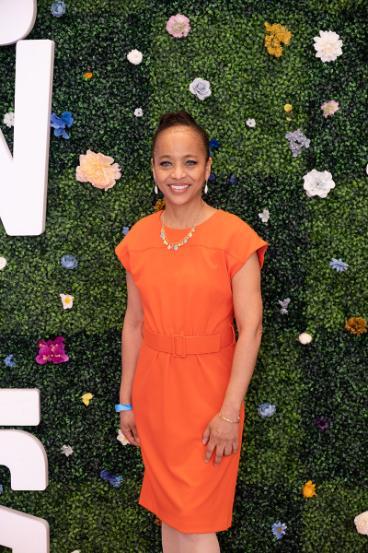
Michele Richardson
Michele Richardson, M.Div., Th.M., MBA, director of the College’s Wellness Center, was not initially attracted to the industry. Her passion for promoting holistic wellness was born as a result of her personal journey, including experiencing first-hand the intrinsic ways wellness is connected to every aspect of our lives.
One in six Americans suffer from a diagnosable, treatable mental health condition, and communities of color are more likely to experience risk factors for mental health disorders. Richardson notes that while the COVID-19 pandemic has intensified the challenges and widened the gap, it has also resulted in some gains.
“Among those things we will look back and list as ‘silver linings’ from the pandemic, I would include the de-stigmatization of mental health and mental well-being among underrepresented groups,” she said. “Many see admitting to needing counseling or therapy as weakness. Some see it as having failed in some way. This is particularly true in underrepresented groups. But, what we are witnessing in real-time, is a swift move away from mental health support and treatment being stigmatized to it being optimized.”
Richardson cautions that the increased reliance on mental health support must be balanced with adequate resources for mental health practitioners who have yet to experience the full effects of the post-pandemic shift.
When asked to identify the most important thing individuals can do to safeguard their mental health, Richardson said, “Ask for help. Don’t minimize your mental wellness as not being significant. It is.” Indeed, as a mental health advocate, it is especially important for Richardson to tend to her own wellness. “Each of us is often required to give more than we think we have to give,” she shared.
“There is also the phenomenon of compassion fatigue or vicarious trauma. This means that the traumatic experiences of others transfer to us in some way so we then experience someone else’s trauma as our own,” she explained. “Regardless of our roles, personal or professional, awareness is key. Listening to our bodies is key. I learned these lessons the hard way and this drives my advocacy for holistic wellness.” To learn more about National Minority Mental Health Awareness Month and access available resources, click here.
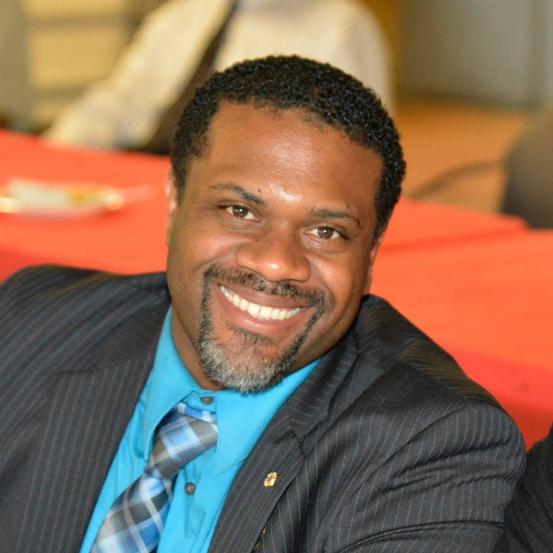
Jonn Mack
On September 11, 2001, Jonn Mack, assistant professor and academic coordinator for the College’s Paramedic Program, was a student at Prince George’s Community College, immersed in a lecture about paramedicine, when an urgent message delivered to his instructor by the dean of Health Sciences changed everything.
September 11 marks the anniversary of a turning point in the history of the United States. More than two decades later, the country reflects with precision on the memories of lives tragically lost and the courageousness of first responders and other service members. Join Professor Mack as he recounts his experiences on this historic day.
After Mack’s instructor informed the class that planes had struck the World Trade Center and the Pentagon, Mack and his classmates immediately left and began to call relatives and friends who worked at the sites. “A few minutes later, the Fire Chief, Ronald D. Blackwell, who was on his way to his swearing in ceremony in Upper Marlboro, arrived and informed us that we were all on call and we were to await further orders,” Mack recalled.
Mack is now a retired paramedic/firefighter from Prince George’s County’s Fire Emergency Management Services (EMS) Department, and his tenure includes the roles of firefighter, paramedic, recruiter, EMS sector supervisor, and Station Commander. He served as part of the Hurricane Katrina response in Mississippi, distributing food, ice, and water to affected areas.
Little did he know as a student all those years ago that he was about to get a taste of what it meant to be an EMS professional. “What seemed like an eternity passed, watching the images of the burning towers on an old television with rabbit ears,” said Mack. “We all seemed to hold a collective breath, waiting and wondering if this was the end. Once our phones rang and our beepers went off, we all knew it was time to go to work.”
On the way to Landover Hills, Mack noted that the Beltway and Route 50 were completely empty, barring EMS vehicles, without even a tractor trailer in sight. Reports of bombs exploding throughout downtown D.C. were later discovered to be jets breaking the sound barrier to protect the East Coast.
“When the towers fell, I felt an immense loss,” Mack recounted. “At that moment, we didn’t know how many brothers and sisters we’d lost, but we all knew that the public safety profession would never be the same.” On 9/11, 343 firefighters; 65 police officers, including an FBI agent; and 8 EMS personnel lost their lives tragically in New York, with 2,562 additional casualties.
When asked what message he has for students who navigate increasingly difficult environmental conditions during such times of division in our world, Professor Mack replied, “We must learn to work together to find what binds us as humans versus what separates us as individuals.”
“It is imperative that we listen and do not make assumptions about a person’s personality, motives, and drive,” he added. “We must evaluate each person and understand that while we disagree on what the goal should be, we’re all humans and deserve to be respected by one another.”
Kevin Totimeh
Prince George’s Community College (PGCC) student Kevin Totimeh had a strong passion for science from an early age. Growing up in Upper Marlboro, MD, Totimeh was captivated on TV by Bill Nye the Science Guy and his scientific presentations in the laboratory. Now, as a PGCC student who will graduate this fall semester, Totimeh is focused on turning his passion for science into a successful career as a scientist.
“I have always had a love and interest for science since I was 10 years old,” Totimeh describes. “I adored gaining knowledge when working on my science fair experiments in elementary and middle school, learning about gravity, sub-particles that make up atoms, and the periodic table. That’s when I knew I wanted to become a scientist.”
After graduating Frederick Douglass High School in 2020, Totimeh started attending PGCC that fall as a chemistry major. As a new student to the College, Totimeh quickly found resources to support his academic journey. He was awarded the Promise Scholarship to cover his tuition and textbook costs; he also found support from the College’s counseling services to help calm his anxiety with the transition to college from high school—a challenge many students face in their early semesters. “There have been many great resources that PGCC has provided me to ensure academic success,” he says. “I didn’t know what to expect when starting college in the fall of 2020.”
Totimeh continued to find more support from PGCC’s faculty and staff. He credits them for making his time here even more enjoyable. “I have met so many great professors, advisors, and even counselors,” he explains. “The people at PGCC are very welcoming and supportive of my passions and interests, and it warms my heart.”
For his last semester, Totimeh was given the opportunity to become a research intern for general chemistry by his General Chemistry I professor, Bill Mentor. Kevin was pleasantly surprised with the role, and he is confident that this experience will further his academic and future professional career even more.
In his spare time, Totimeh practices drawing and enjoys performing cartoon impressions. He also enjoys watching TV shows, spending time during the pandemic catching up on old shows and discovering new ones. After graduating this fall, Totimeh plans to transfer to a university to continue his undergraduate studies and receive his Bachelor of Arts in Science.
“It is your choice on what path you would like to follow in life,” says Totimeh when asked for any advice to give fellow students. “If you have a dream and love something, you can put your love, time, and effort into your dream. Then, you can achieve anything you set your mind to.”
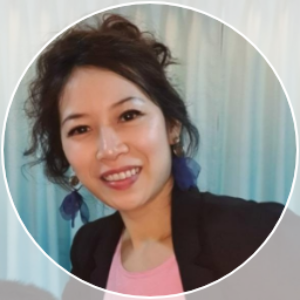
Chaw Kalayar
Chaw Kalayar, M.S., is the English for Refugees and Asylees (ERA) ESL Program Coordinator for Prince George’s Community College (PGCC). In her position, she oversees the College’s ERA program, which provides English language instruction for refugees to apply in all areas of their lives in the United States. This interview has been edited and condensed.
When was the College’s ERA program started?
The ERA program (originally called Refugee Training Program) came to PGCC in October 2014. Way before that, it was rooted in the public school system.
How many participants are in the program each year?
There were about eight English classes last year, and we currently have about 15 English classes and two computer classes, so we have more than doubled in size. There are over 300 students per session on average. Our program size dramatically increased this year due to the influx of Afghan refugees placed in Maryland.
What is your background in refugee work? What inspired you to coordinate this program?
While I was studying in the U.S., I volunteered to teach refugees and immigrants in the community in Minnesota. Due to the military coup in 2021, I migrated to the U.S. a year ago from Myanmar in Southeast Asia, previously known as Burma. Before I migrated to the U.S. last year, my most recent employment was with the World Learning organization to manage an English language program based in my country. When I saw the coordinator position at PGCC, it was a perfect fit for my passion and experience.
Despite all the things we have been able to do as a team, it is our job to constantly find out how we can serve our students better, simplify the process, and create more convenience for them whenever possible. Being in a position to support students, teachers, and other people on a day-to-day basis is really fulfilling. Knowing that I can make a difference in somebody’s life inspires me every day.
How has the ERA program impacted the lives of students?
Our students learn literacy, life, and employment skills through English in different classes. They learn how to read letters and words, fill out forms, buy groceries, and find a job—things they need and can apply outside in real life right away. One pilot service we recently added is on-the-spot registration for students who visit our building with the necessary documents. Another new initiative we started was our own tutoring program for beginners in English struggling with instruction in the lowest-level classes. Our in-house computer classes also help our English learners since language and technology have become inseparable these days, and most classes continue to be online. It is always exciting to see what our students are capable of doing because of the tools our program can provide.
In April, the University of Maryland announced its plan to house Afghan refugees on its campus for one year. How can schools and universities get more involved in supporting refugees? Will there be a greater need for this in the future?
Schools and universities should have allotted budgets for the refugee community and offer different projects based on need assessments for refugee communities. Another way is to get high school and university students involved in service projects or have them initiate projects for the refugee community that will benefit everyone. It is great that the University of Maryland stepped up and took responsibility for the temporary housing of 25 families for a year. If more schools, colleges, and universities took some steps like University of Maryland, we can’t imagine how big the impact would be on the refugee community that, in turn, can prepare those students to become global citizens with better interpersonal and intercultural skills.
What do you enjoy most about working at Prince George’s Community College?
The thing I enjoy most is the supportive working atmosphere. I am very fortunate to have a supportive supervisor and very dedicated team members to work with. During the time when we had an influx of new Afghanistan students and were understaffed, I worked late in the evenings and on weekends a lot. My hard work did not go unnoticed, and I was promoted to a full-time position after seven months, although the coordinator position had been part-time for many years.
Are there any specific resources from the College for students that you would like them to be aware of?
PGCC provides groceries through the PGCC Cares Owl Market; students can get 15 free grocery items per day of their choice and up to 50 items per week. It is really exciting that this service is now available to our refugee student population at PGCC. Another recent change is that refugee students from our ERA program can take free classes in the Transition ESL program, which offers more advanced-level English courses. Our students can now take both low-level and high-level English classes for free, which means we can serve a broader population of refugee students.
Lastly, are there any organizations or charities supporting refugees that you want to share?
Our funder, the Maryland Office for Refugees and Asylees, oversees all state-funded programs for refugees and asylees. Resettlement agencies such as the International Rescue Committee, Lutheran Social Services, and Ethiopian Community Development Council help the refugee community with a variety of services. The Mayor’s Office of Immigrant Affairs provides refugees with vocational training and employment services. Also, the Maryland Department of Health has a Refugee Health Screening Program and a Refugee Health Promotion Program.
Upwardly Global is a free program that helps immigrants and refugees to find professional work. Employ Prince George’s provides free career advice, skills training, and job search assistance. The registered Apprenticeship Program in Maryland is another good program for those who like to earn and learn at the same time with a progressive wage and intensive training from a mentor.
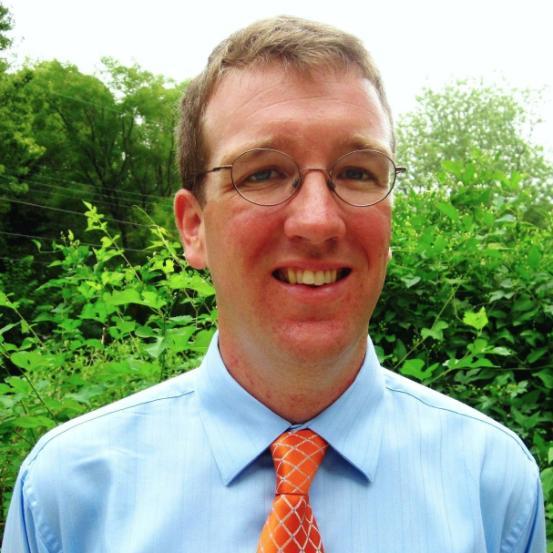
Dr. Patrick Hickey
Dr. Patrick Hickey, professor of political science in the Department of Social Sciences, chose Prince George’s Community College because of its focus on meeting the needs of students. Now in his second year of teaching at the College, Dr. Hickey notes that he is impressed by the teaching excellence and commitment to student success exhibited by his colleagues.
“I love working at an institution with a clear mission to serve its students first and foremost,” he said. “The administration, faculty, and staff are all dedicated to this mission.”
Dr. Hickey understands the value of incorporating real-world experiences into his courses that position students for success upon graduation. On November 8, he welcomed Town of Upper Marlboro Mayor Sarah Franklin to his Introduction to Government class virtually, where she discussed career opportunities within municipal government.
Mayor Franklin, who has served in her role since 2021, brought a special guest with her for the conversation: Town Administrator Kyle Snyder, a PGCC alumnus. Snyder shared his journey from his time at PGCC to his current career in local government.
Students learned about Mayor Franklin’s role in addition to the major concerns of citizens in Upper Marlboro, including trash collection, speeding and aggressive driving, and lack of funding for a nighttime police officer. Major challenges in recent years include COVID-19 and a major fire in the downtown area.
Nearly every one of Dr. Hickey’s students was able to ask the mayor a question to which she responded thoughtfully.
One of Dr. Hickey’s students reflected on the experience: “I learned that it takes a lot of work to keep a town running. While the mayor’s job is technically part-time, she usually needs to work a lot more. She often works 60-hour weeks! I didn't know that it requires so much time and effort to make things run correctly.”
“I learned that the Town of Upper Marlboro is forever growing and changing,” another student shared. “I also found out that budget meetings are ‘the place to be’ if you want to understand or influence local government.”
The Town of Upper Marlboro offers both paid and unpaid opportunities for students. These entry-level positions provide students with a pipeline to a potential career in local government. Any student interested in learning more should contact Dr. Patrick Hickey at hickeypt@pgcc.edu.
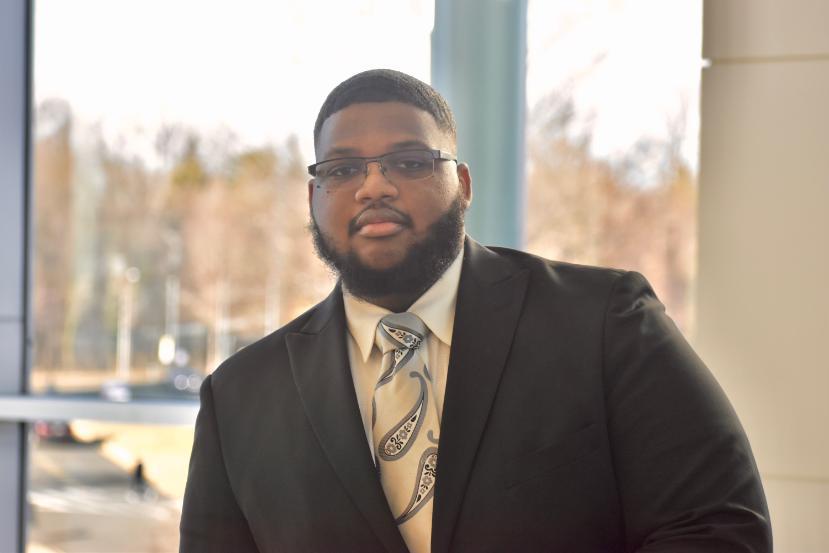
Marques Carr
Business administration major Marques Carr, a resident of Largo, Maryland, chose to further his education at Prince George’s Community College because it was the most affordable option. “I knew I had a lot of growing up to do, and I was not ready to navigate the university dynamic yet,” he said.
Since becoming a part of the PGCC community, Carr has found a sense of belonging, with prior service as a student worker on campus, as well as being an active member of Diverse Male Student Initiatives, an experiential, 2-year program at the College that empowers men to assume leadership roles.
“The list of resources that PGCC has provided me with is extensive,” said Carr. “Everything from resume writing to manhood mentoring. The person I am now is largely due to PGCC.” When asked what has surprised him most about being a student at the College, Carr replied simply: “The resources that I didn’t know were sitting under my nose.”
From an early age, Marques Carr was interested in a career in the financial sector, and he discovered his desired path within the industry while completing an accounting class in high school. “During the pandemic, I saw how many people’s finances were unstable, and my interest grew even more,” he shared.
“The very moment I knew that accounting was where I wanted my focus to be is when I sat and talked to a CPA. They informed me of the principles that accounting taught them to improve their way of thought.”
Summer 2023, Carr is excited to participate in an internship with Price Waterhouse Coopers (PWC), where he will have an opportunity to shadow individuals in different branches of the company. “I will be able to see what my workload would be and view the company culture,” he shared.
At the end of the internship, Carr and his fellow interns are slated to present a proposal to a nonprofit agency. “From this experience, I look to gain more insight as to what the day-to-day is in accounting, including tax and audit,” he said. Carr is confident that the experience will provide space for him to learn and grow professionally.
Upon graduation, Carr plans to attend Morgan State University, where he will major in accounting and minor in finance. “I plan to do everything I set out to do, but most importantly, I will enjoy myself while matriculating through school,” he said.

